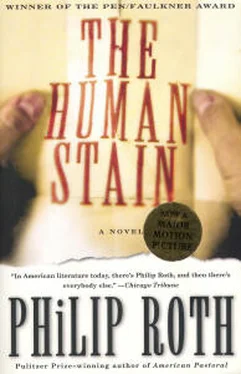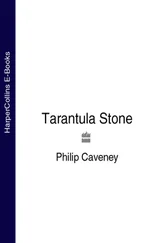So delighted was he by what he heard that Coleman broke loose from Ernestine's grasp and burst away up the street, in exuberant delight running up Central to Evergreen and then back, crying aloud, “My two weakest subjects — which are those?” It was as though in attributing to Coleman an academic weakness, Dr. Fensterman had told the most hilarious joke. “What'd they say, Ern? What did Dad say?” “I couldn't hear. He said it too low.” “What did Mom say?” “I don't know. I couldn't hear Mom either. But what they were saying after the doctor left, I heard that.” “Tell me! What?” “Daddy said, ‘I wanted to kill that man.’” “He did?” “Really. Yes.” “And Mom?” “‘I just bit my tongue.’ That's what Mom said—‘I just bit my tongue.’” “But you didn't hear what they said to him? ” “No.” “Well, I'll tell you one thing — I'm not going to do it.” “Of course not,” Ernestine said. “But suppose Dad told him I would?” “Are you crazy, Coleman?” “Ernie, three thousand dollars is more than Dad makes in a whole year. Ernie, three thousand dollars!” And the thought of Dr. Fensterman handing over to his father a big paper bag stuffed with all that money set him running again, goofily taking the imaginary low hurdles (for successive years now, he had been Essex County high school champ in low hurdles and run second in the hundred-yard dash) up to Evergreen and back. Another triumph — that's what he was thinking. Yet another record-breaking triumph for the great, the incomparable, the one and only Silky Silk! He was class valedictorian, all right, as well as a track star, but as he was also only seventeen, Dr. Fensterman's proposal meant no more to him than that he was of the greatest importance to just about everyone. The larger picture he didn't get yet.
In East Orange, where mostly everyone was white, either poor Italian — and living up at the Orange edge of town or down by Newark's First Ward — or Episcopalian and rich — and living in the big houses out by Upsala or around South Harrison — there were fewer Jews even than there were Negroes, and yet it was the Jews and their kids who these days loomed larger than anyone in Coleman's extracurricular life. First there was Doc Chizner, who had as good as adopted him the year before, when Coleman joined his evening boxing class, and now there was Dr. Fensterman offering three thousand dollars for Coleman to place second academically so as to enable Bert to come in first. Doc Chizner was a dentist who loved boxing. Went to the fights whenever he had a chance — in Jersey at Laurel Garden and at the Meadowbrook Bowl, to New York to the Garden and out to St. Nick's. People would say, “You think you know fights until you sit next to Doc. Sit next to Doc Chizner, and you realize you're not watching the same fight.” Doc officiated at amateur fights all over Essex County, including the Golden Gloves in Newark, and to his local classes in boxing Jewish parents from all over the Oranges, from Maplewood, from Irvington — from as far away as the Weequahic section over at Newark's southwest corner — sent their sons to learn how to defend themselves. Coleman had wound up in Doc Chizner's class not because he didn't know how but because his own father had found out that since his second year of high school, after track practice, all on his own — and as often sometimes as three times a week — Coleman had been sneaking down to the Newark Boys Club, below High Street in the Newark slums to Morton Street, and secretly training to be a fighter. Fourteen years old when he began, a hundred and eleven pounds, and he would work out there for two hours, loosen up, spar three rounds, hit the heavy bag, hit the speed bag, skip rope, do his exercises, and then head home to do his homework. A couple of times he even got to spar with Cooper Fulham, who the year before had won the National Championships up in Boston. Coleman's mother was working a shift and a half, even two shifts running at the hospital, his father was waiting tables on the train and hardly at home other than to sleep, his older brother, Walt, was away first at college, then in the army, and so Coleman came and went as he liked, swearing Ernestine to secrecy and making sure not to let his grades slip, in study hall, at night in bed, on the buses back and forth to Newark — two buses each way — plugging away even harder than usual at his schoolwork to be sure nobody found out about Morton Street.
If you wanted to box amateur, the Newark Boys Club was where you went, and if you were good and you were between thirteen and eighteen, you got matched up against guys from the Boys Club in Paterson, in Jersey City, in Butler, from the Ironbound PAL, and so on. There were loads of kids down at the Boys Club, some from Rahway, from Linden, from Elizabeth, a couple from as far away as Morristown, there was a deaf-mute they called Dummy who came from Belleville, but mostly they were from Newark and all of them were colored, though the two guys who ran the club were white. One was a cop in West Side Park, Mac Machrone, and he had a pistol, and he told Coleman that if he ever found out Coleman wasn't doing his roadwork, he'd shoot him. Mac believed in speed, and that's why he believed in Coleman. Speed and pacing and counter-punching. Once he'd taught Coleman how to stand and how to move and how to throw the punches, once Mac saw how quickly the boy learned and how smart he was and how quick his reflexes were, he began to teach him the finer things. How to move his head. How to slip punches. How to block punches. How to counter. To teach him the jab, Mac repeated, “It's like you flick a flea off your nose. Just flick it off him.” He taught Coleman how to win a fight by using only his jab. Throw the jab, knock the punch down, counter. A jab comes, you slip it, come over with the right counter. Or you slip it inside, you come over with a hook. Or you just duck down, hit him a right to the heart, a left hook to the stomach. Slight as he was, Coleman would sometimes quickly grab the jab with both his hands, pull the guy and then hook him to the stomach, come up, hook him to the head. “Knock the punch down. Counterpunch. You're a counterpuncher, Silky. That's what you are, that's all you are.” Then they went to Paterson. His first amateur tournament fight. This kid would throw a jab and Coleman would lean back, but his feet would be planted and he could come back and counter the kid with a right, and he kept catching him like that for the whole fight. The kid kept doing it, so Coleman kept doing it and won all three rounds. At the Boys Club, that became Silky Silk's style. When he threw punches, it was so nobody could say he was standing there doing nothing. Mostly he would wait for the other guy to throw, then he'd throw two, three back, and then he'd get out and wait again. Coleman could hit his opponent more by waiting for him to lead than by leading him. The result was that by the time Coleman was sixteen, in Essex and Hudson counties alone, at amateur shows at the armory, at the Knights of Pythias, at exhibitions for the veterans at the veterans hospital, he must have beaten three guys who were Golden Gloves champs. As he figured it, he could by then have won 112,118,126 ... except there was no way he could fight in the Golden Gloves without its getting in the papers and his family finding out. And then they found out anyway. He didn't know how. He didn't have to. They found out because somebody told them. Simple as that.
They were all sitting down to dinner on a Sunday, after church, when his father said, “How did you do, Coleman?”
“How did I do at what?”
“Last night. At the Knights of Pythias. How did you do?”
“What's the Knights of Pythias?” Coleman asked.
“Do you think I was born yesterday, son? The Knights of Pythias is where they had the tournament last night. How many fights on the card?”
Читать дальше












